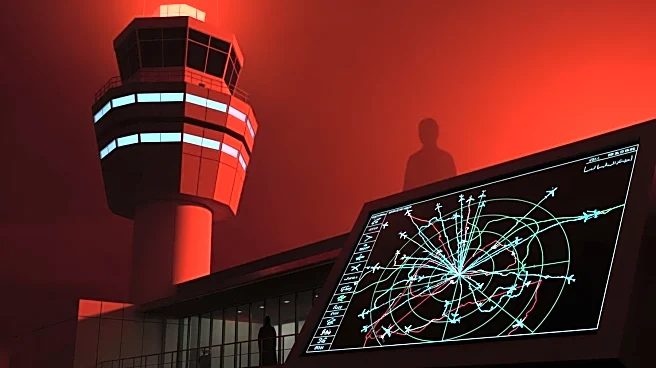What's Happening?
Flight cancellations and delays are escalating across the United States due to air traffic controller shortages exacerbated by the ongoing government shutdown. On Monday, 1,623 flights were canceled, representing
6.3% of the day's schedule. President Trump has threatened to dock the pay of air traffic controllers who are absent from work, while offering bonuses to those who continue working without taking time off. Major airlines like Delta and United are offering extra pay to crew flights in an effort to manage the disruptions. The National Air Traffic Controllers Association has praised the controllers for their dedication during this challenging period.
Why It's Important?
The worsening flight disruptions highlight the critical role of air traffic controllers in maintaining the efficiency and safety of air travel. The government's inability to resolve the shutdown is causing significant operational challenges for airlines, affecting thousands of passengers and leading to financial losses. The situation underscores the importance of stable government operations for the aviation industry and the broader economy. Airlines are forced to implement costly measures to mitigate the impact, which could have long-term implications for their financial health and customer satisfaction.
What's Next?
As the shutdown continues, airlines and passengers are likely to face ongoing disruptions. The Trump administration's mandate for airlines to cut domestic flights at major airports will further strain the system. Airlines are expected to continue offering incentives to staff to cover flights and may implement additional measures to manage the situation. The aviation industry will be closely monitoring government actions and negotiations to assess the potential for a resolution. The outcome of these discussions will be crucial in determining the future stability of air travel operations.
Beyond the Headlines
The current crisis raises concerns about the resilience of the U.S. air travel system and the impact of political decisions on operational stability. The situation highlights the need for effective crisis management strategies and the importance of government-industry collaboration to address systemic challenges. It also underscores the broader societal impact of government shutdowns, affecting not only the aviation industry but also passengers and businesses reliant on air travel. The crisis serves as a reminder of the interconnectedness of government operations and private sector activities.









